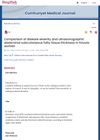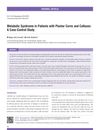 18 citations,
May 2017 in “Fertility Research and Practice”
18 citations,
May 2017 in “Fertility Research and Practice” Larger ovarian size is linked to higher insulin resistance in women with PCOS.
 16 citations,
February 2016 in “Gynecological Endocrinology”
16 citations,
February 2016 in “Gynecological Endocrinology” Indian women with PCOS from Delhi and Srinagar show different symptoms, with Delhi women having higher obesity and blood sugar issues, and Srinagar women showing more hair growth and testosterone levels.
 12 citations,
February 2022 in “International Journal of Clinical Practice”
12 citations,
February 2022 in “International Journal of Clinical Practice” Oxidative stress is higher in women with PCOS, especially if they're obese, and it may increase their risk of heart disease.
 74 citations,
October 2015 in “Experimental Dermatology”
74 citations,
October 2015 in “Experimental Dermatology” Acne patients have higher levels of mTOR in their skin, which could be linked to future metabolic disease.
 1 citations,
December 2022 in “Gynecological Endocrinology”
1 citations,
December 2022 in “Gynecological Endocrinology” The most common skin issues in females with Polycystic Ovary Syndrome (PCOS) are excessive hair growth, hair loss, oily skin, acne, dark skin patches, and skin tags, which may be linked to hormone and insulin levels.
 September 2018 in “Cumhuriyet medical journal”
September 2018 in “Cumhuriyet medical journal” Women with more body hair tend to have thicker belly fat and more metabolic health issues.
 31 citations,
February 2021 in “Nutrients”
31 citations,
February 2021 in “Nutrients” Curcumin may improve blood sugar levels and cholesterol in people with PCOS, but more research is needed.
 17 citations,
May 2019 in “Diabetes and Metabolic Syndrome: Clinical Research and Reviews”
17 citations,
May 2019 in “Diabetes and Metabolic Syndrome: Clinical Research and Reviews” High fasting insulin levels in women with PCOS are linked to a higher risk of heart and metabolic problems.
 1 citations,
January 2016 in “International journal of reproduction, contraception, obstetrics and gynecology”
1 citations,
January 2016 in “International journal of reproduction, contraception, obstetrics and gynecology” Hypothyroidism may worsen metabolic problems like insulin resistance and obesity in women with PCOS.
 June 2021 in “International Journal of Research in Dermatology”
June 2021 in “International Journal of Research in Dermatology” Women with acne and PCOS should be checked for insulin resistance and related symptoms.

People with androgenic alopecia are more likely to have metabolic syndrome than healthy individuals.
 4 citations,
June 2018 in “PLOS ONE”
4 citations,
June 2018 in “PLOS ONE” Iron levels are linked to insulin resistance in men and postmenopausal women, but not in premenopausal women.
 46 citations,
June 2015 in “Fertility and Sterility”
46 citations,
June 2015 in “Fertility and Sterility” Insulin resistance is significantly linked to a higher risk of depression in women with PCOS.
 28 citations,
October 2013 in “Journal of The American Academy of Dermatology”
28 citations,
October 2013 in “Journal of The American Academy of Dermatology” Ovarian SAHA syndrome makes women with PCOS more resistant to insulin and increases their risk of blood sugar problems.
 June 2022 in “Journal of the turkish academy of dermatology”
June 2022 in “Journal of the turkish academy of dermatology” People with plantar corns and calluses may have a higher chance of having metabolic syndrome.
 8 citations,
November 2012 in “Journal of Endocrinological Investigation”
8 citations,
November 2012 in “Journal of Endocrinological Investigation” Greek women with classic PCOS are more likely to have metabolic syndrome and insulin resistance than those with newer PCOS types.
 2 citations,
February 2021 in “Endocrinology, diabetes & metabolism case reports”
2 citations,
February 2021 in “Endocrinology, diabetes & metabolism case reports” A teenage girl had both a rare ovarian tumor and a severe form of polycystic ovarian syndrome.
 2 citations,
October 2022 in “Frontiers in genetics”
2 citations,
October 2022 in “Frontiers in genetics” Late diagnosis of congenital adrenal hyperplasia can greatly affect physical development, gender identity, and sexual health.
 3 citations,
August 2020 in “Nutrition Journal”
3 citations,
August 2020 in “Nutrition Journal” Spinach-derived thylakoid supplements plus a low-calorie diet helped obese women with polycystic ovary syndrome lose weight and improve their metabolism.
 3 citations,
September 2021 in “International Journal of Molecular Sciences”
3 citations,
September 2021 in “International Journal of Molecular Sciences” Androgens and a high-fat diet may increase the risk of severe COVID-19 in women with PCOS by upregulating certain proteins in the heart and kidneys.
 73 citations,
June 2008 in “The Journal of Clinical Endocrinology and Metabolism”
73 citations,
June 2008 in “The Journal of Clinical Endocrinology and Metabolism” Polycystic ovarian shape is a genetic sign of PCOS and its hormonal and metabolic features can be inherited.
 53 citations,
September 2014 in “Reproductive Biology and Endocrinology”
53 citations,
September 2014 in “Reproductive Biology and Endocrinology” Different types of PCOS have different levels of metabolic problems, with the most severe type showing the highest disturbances.
 32 citations,
April 2016 in “Journal of Obstetrics and Gynaecology Research”
32 citations,
April 2016 in “Journal of Obstetrics and Gynaecology Research” Women with severe types of PCOS are more likely to have metabolic syndrome, and belly fat is a key predictor of this risk.
 11 citations,
October 2018 in “Hormone and Metabolic Research”
11 citations,
October 2018 in “Hormone and Metabolic Research” Women with PCOS have similar bone density to healthy women, but those who are obese have higher bone density at some body sites.
 11 citations,
April 2018 in “Nutrition Research”
11 citations,
April 2018 in “Nutrition Research” Chromium supplements don't help with weight loss or improve hormone and metabolism issues in people with polycystic ovary syndrome.
 December 2022 in “The Indian journal of chest diseases & allied sciences”
December 2022 in “The Indian journal of chest diseases & allied sciences” Women with PCOS often have sleep problems, including sleep apnea, which are linked to obesity and depression.
 14 citations,
July 2016 in “Fertility and Sterility”
14 citations,
July 2016 in “Fertility and Sterility” Changing the diagnosis criteria for PCOS might miss women at risk for related health issues.
 18 citations,
September 2015 in “Clinical Endocrinology”
18 citations,
September 2015 in “Clinical Endocrinology” Women with PCOS have higher levels of a certain growth factor, which can be reduced by taking metformin.
 13 citations,
March 2019 in “Physiological Research”
13 citations,
March 2019 in “Physiological Research” Overweight women with PCOS have higher levels of certain hormones that could indicate a higher risk of heart and metabolic problems.
 1 citations,
July 2022 in “Functional foods in health and disease/Journal of functional foods in health & disease”
1 citations,
July 2022 in “Functional foods in health and disease/Journal of functional foods in health & disease” Taking a probiotic supplement twice a day improved hair growth, skin hydration, and metabolic health in adults at risk of metabolic syndrome.






























